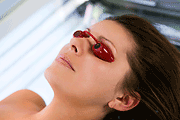Tanning May Be an Overlooked Addiction
Tanning may be addictive, a new study in press with Addiction Biology has found.
Bryon Adinoff, M.D., a professor of psychiatry and substance abuse research at the University of Texas Southwestern Medical Center, and colleagues used a brain imaging technique called SPECT to measure blood flow in the brains of seven frequent tanning bed customers while they were exposed to ultraviolet light and to sham ultraviolet light. They found an increase in blood flow in certain areas of the subjects' brains that are associated with reward while the subjects were exposed to ultraviolet light, but not while they were exposed to sham light. "These findings suggest that ultraviolet light may have centrally rewarding properties that encourage excessive tanning," the scientists said.
A few months ago, another study also suggested that tanning may be addictive. Of some 400 students at a large university, more than 200 had used indoor tanning facilities, and more than a third met addiction-to-tanning criteria adapted from DSM-IV-TR criteria for substance-related disorders. Read more about this study in Psychiatric News at http://pn.psychiatryonline.org/content/45/13/24.1.full.
The tanning addiction topic also underscores the importance of the mind-body connection, and American Psychiatric Publishing has just published a book on that subject, titled Clinical Manual of Psychosomatic Medicine: A Guide to Consultation-Liaison Psychiatry. Purchasing information is available at www.appi.org.
(Image: Shutterstock)






-Jun-24-2025-05-39-16-3390-PM.jpg?height=200&name=Petros%20Levounis%20OFFICIAL%20600%20(1)-Jun-24-2025-05-39-16-3390-PM.jpg)